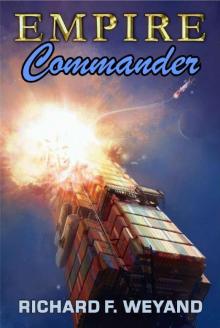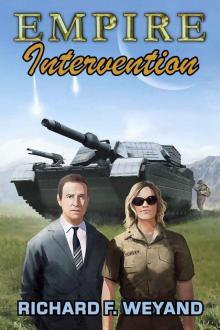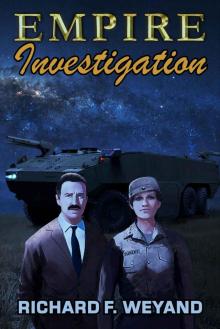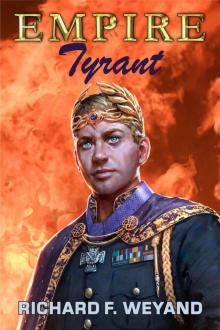- Home
- Richard F. Weyand
Commander Page 5
Commander Read online
Page 5
“Not if we run a plasma conduit up to yaw and pitch thrusters like the larger ships,” Narang said. “And if we make it a big plasma conduit....”
“When it hits the larger ship, it will vent the engine plasma into the hole the depleted uranium nosepiece made, at least for as long as the containment holds,” Denny said. “That won’t be localized damage, it will gut the ship. That’s brilliant, Vipin.”
“I thought you’d like it.”
Freja Gunnarsson was in VR adding shading and detail to the ship image she had extracted from the three-D modeling engine. They had finally stabilized enough for her to do her final touch-ups, to render the shapes more lifelike.
Ilia Sobol had suggested they submit VR simulations of battle scenarios with their proposals. Everybody liked VR simulations, and there was no better way to put some emphasis on the performance numbers of the designs than show ‘battle footage’ in real time.
She was finishing up one of the models when Jared Denny popped into her VR studio.
“Hi, Freja, how’s it coming along,” Denny asked.
“Almost done. Just finishing up some detail work.”
The simulation of the ship floated in front of her, without any background or context, as she added small details. The ship was about ten feet in diameter and ten feet long, with the huge impeller sticking out tens of feet to her left.
“Really.”
She could tell he wasn’t impressed. Well, he wasn’t seeing the whole thing in context, either. It annoyed her enough to give him a bit of a shock.
“Oh, yes. You see?”
Denny almost staggered as the conventional room simulation disappeared and they floated in deep space. The ship had shrunk until it was the size of a coffee mug. It flew in a formation of two dozen such ships as they fled the enemy formation coming in from the right, three dozen battleships of conventional, crewed design.
As they fled, the two dozen cruisers cut engines, rotated and each fired half a dozen shots at the pursuing enemy, before rotating once again and reapplying thrust. The enemy went into evasive maneuvers, but the missiles were relentless as they bore down on their foes. Overwhelmed by dozens of missiles apiece, the six targeted ships in the pursuing fleet exploded.
As they watched, the fleeing ships flipped, fired, and flipped again. Another half a dozen pursuing ships exploded. The explosions were loud within VR, and the VR cooperated by shaking the simulation around them and concussing the chests of their avatars, like the bass drum in a parade.
“I tried it without sound, but it didn’t have the same pizzazz,” Gunnarsson said.
With the battle down to one-to-one odds, and with the enemy fleet breaking up in the evasive maneuvers it was using to try to evade the missiles, the fleeing ships suddenly flipped. They went to maximum acceleration toward the enemy, and their guns went to continuous fire. It was clear now they had been accelerating at a fraction of their capability, just hard enough to stay at the enemy’s extreme range to keep them coming on.
The sudden turnabout, greatly increased acceleration, and missile onslaught caught the pursuing fleet out of formation, and their defensive fire against the incoming missiles could not be coordinated. It was every ship for itself.
For its part, the erstwhile fugitives did not fire randomly. They concentrated fire on groups of half a dozen ships at a time, then moved on as those ships were overwhelmed by the massed fire.
After round after round of thunderous explosions, it was over. The enemy fleet was gone. The disciplined formation of the victors had been able to coordinate their defensive fire, and only five of the twenty-four ships were lost.
“Then there’s this one.”
The background shifted suddenly to the unsettling formlessness of hyperspace. Half-seen shapes and patterns swirled in the grey void. One ship approached, a battleship of conventional, crewed design. Then a second ship entered the scene. Both ships were limited in velocity by the nature of hyperspace itself, so the small ship had no acceleration advantage, but it was hugely maneuverable. The big ship tried all sorts of evasive maneuvers, but it was too slow on the helm to evade the attacker.
The small ship targeted the engine area of the battleship and penetrated well into the larger ship. As it did so, engine plasma vented out into its target and burned its way both out the impact hole and deep into the targeted ship. The ship’s thrust went to zero and both ships dropped out of hyperspace.
The VR dropped the viewers out of hyperspace as well, and the grey void was replaced by the star-glittered background of deep space. The big ship lost plasma containment at that point and exploded.
Gunnarsson switched the VR channel back to her studio, where the ten-foot model hovered in front of her as before. She went back to doing her detail work.
“So, yeah, they’re coming along,” she said without looking away from her work.
Denny was still recovering from the overwhelming ‘thereness’ of the experience. He held up his hands in apology.
“Sorry, Freja. I’m just getting nervous with the deadline coming up.”
“I understand. But no, I’m good.”
When their submission packets were done, they had a little ceremony in VR. Denny drew lots from a hat – where had anybody found a VR simulation of an ancient fedora? – and it was Freja Gunnarsson who was selected. She came up to the front of the room in VR and pushed a big button on the lectern there, transmitting their submission to the ship acquisition department of the Imperial Navy.
A cheer went up, and there were congratulations all around. As no two of them were even on the same planet, much less in the same building, there were no celebratory libations.
Not together, anyway.
Interest From Afar
Harold Pinter, the prime minister of the Democracy of Planets, looked out over the capital city of Demos on the planet Olympia. It was a constructed city, built by and for the bureaucracy when the political tensions between Earth and its oldest colonies had built to a head over the Earth’s perceived dominance. The capital had been moved from the birthplace of man to a more centrally located planet.
From his office in the Executive Building, Pinter looked down the Central Mall to the Legislative Building, the seat of the five-hundred-member Parliament. Ostensibly elected by the people – “Demos” was Greek for people – the parliament was in fact a self-perpetuating clique of plutocrats. With each member representing a trillion people spread across a hundred and sixty planets, there were only so many people who had enough name recognition to be able to win such a huge election. Having a famous family name was a huge advantage, and seats in parliament had become semi-hereditary.
Of course, there were always a few surprises. People who beat the odds. But they weren’t much trouble. They were quickly brought into the system of corporate payments – publishing a ghost-written book with a huge advance to the named author was usually the first step – and subsumed into the culture of large government.
As a result, Pinter’s faction had held the parliamentary majority for over twelve years, and would likely continue to do so as long as things went along pretty well. If something upset the apple cart, though, his party could lose enough seats to put them in the minority and elevate his putative rival, Jeremy Totten, to the prime ministership. Such a move wouldn’t change much, as there wasn’t a credit’s worth of difference between the two parties, at least not in terms of the things that mattered to their corporate sponsors. But the press would trumpet it as a huge change, and the people would be mollified, and business would carry on as usual.
Which is not to say Pinter would welcome such a change. He rather enjoyed being prime minister. And that was why he was not looking forward to this morning’s meeting with Karla Jaeger, the Minister of Trade. There were things going on there that had the capability of upending his government.
Even worse, recent events were upsetting their corporate sponsors, and who knew where that could lead.
When Pinter’s secreta
ry showed Jaeger into his office, he got up and came around his desk.
“Minister Jaeger, how good to see you,” Pinter said, shaking her hand.
“I wish I could say the same, Mr. Prime Minister.”
Pinter waved her toward the seating arrangement. As he did, he spoke to his secretary and the inevitable photographer, stenographer, and chief of staff.
“Leave us.”
Once everyone had left and they were both seated in armchairs facing each other, Pinter became less formal.
“All right, Karla, what’s going on?”
“Well, Hal, you know our export business has been slowly eroding over the last two or three years.”
“Yes, you’ve mentioned it.”
“The latest numbers show it’s accelerating. Sintar’s reform of their patent system and the breakup of their reserved shipping markets has been a double whammy for us. On the patent side, their reforms have led to a wave of new products that have made some of our products uncompetitive. Their legacy manufacturers are now scrambling to keep ahead of the upstart new ventures challenging them, and that’s moving their technology ahead at a rapid clip. They are out-innovating us, pure and simple.
“On the shipping side, The safe monopoly shipping markets that had been doled out to the big shippers are gone, and their shippers, both established and newcomers, are casting about for more shipping lanes and more markets. They’re making serious inroads into our import-export business with the other polities in human space, and they’re showing up now with better, cheaper products than we can manage.”
“OK, all this I know, Karla. Your message indicated something new is happening.”
“Yes. Hal, almost a year ago, Sintar stopped building new warships.”
“Yes, that was reported to me.”
“We didn’t know why at the time. Now we think we do. All their shipbuilders – all of them – have turned their entire capacity over to building freighters. Normally, they build a hundred thousand warships or so a year, and perhaps a hundred and fifty thousand freighters. But now they are building no warships at all, and they stand to build three hundred thousand freighters per year while this carries on. As these are all big, long-haul freighters, that represents about a ten-percent increase in their carrying capacity. Per year.”
“Do they have enough market for that many ships?”
“No. Not yet, anyway. The glut has lowered prices, which has prompted all the shipping companies to accelerate their ship acquisitions. Buy while the price is low. But those acquisitions were still falling well short of what the shipbuilders were churning out. Rather than cut down production, however, the government has stepped in and doubled down.”
“In what way?”
“Otto Stauss, the biggest of Sintar’s wholly-owned shippers, has signed contracts to buy up to a hundred and sixty thousand freighters. His current shipping operations have a total of but forty thousand ships.”
“That makes no sense. Where does he even get the capital for that kind of purchase?”
“That’s where it gets interesting. Stauss created a new corporate entity, seeded it with some capital, and applied for a capital loan with Imperial Bank to buy all the freighters the shipbuilders could build. And get this. The total capital he put in is about one percent of the principal, and he specified the interest accrue against principal for the first two years. He has no payments at all for two years.”
“No bank would approve that loan, Karla. They’d be crazy to do it.”
“That’s what you would think, right? And since loans of that size have to be approved by the regulators, even if the bank was crazy enough to approve it, it would get shot down by the government.”
“And that’s not what happened?”
“No. The bank – and by implication, the Sintar government – approved the loan on Stauss’s terms, and the shipbuilders are churning out freighters by the tens of thousands.”
“Damn. That’s not good.”
“You might say that. I might be more emphatic.”
“The question then is, What the hell are they going to do with all those ships?”
“The Sintaran economy is booming right now under the reforms they’ve put in place. Those patent reforms and shipping regulation changes are the big movers there. They’ve also gotten rid of about ninety percent of their corporate regulations, which were protecting entrenched special interests. So the booming economy will eat up some of that extra carrying capacity. But the other thing they are going to do is expand their import-export business. A lot. All Stauss’s ships are long-haul, high-capacity ships. Perfect for making runs from within Sintar to the other polities.”
“That’s going to hurt us.”
“In a really big way, Hal. Our import-export business was already eroding to Sintar. This is going to make it much worse. And we don’t know how long they’re going to keep this up. They’re going to have to start building warships again sooner or later. They won’t just let their navy age in place. But they are for the time being, and the implications for us are not good.”
“What can we do about it, though, Karla? Our options are pretty limited, I would think.”
“What we need to do is disrupt Sintar’s import-export business. Anything we can do to cause them trouble, increase uncertainty, would help. Also, if we can do something to poison the attitudes of other polities against Sintar, get them to impose restrictions or tariffs or boycotts, that could help as well.”
“All right. Let me look into it a bit and see if we can’t do something there. I don’t want to do anything overt, though.”
Pinter shook his head.
“Damn it, Karla, why doesn’t anybody bring me any easy problems?”
Pinter met with the Foreign Minister, Jules Morel, and the Defense Minister, Pavel Isaev, to discuss how the Democracy of Planets might make life a little more difficult for the Sintaran Empire without an open conflict, or at least not one involving the DP directly. He began by briefing them on Jaeger’s information, then asked for suggestions.
“Well, that may be the explanation of why they’ve halted warship construction,” Isaev said. “Normally, you would stop ordering a class of warships if you were going to replace them with a new design. That’s pretty standard procedure. But stopping all warship construction across the board hints at a different agenda. This seems as likely as any. It won’t be for long, though.”
“It looks like it will be eighteen months or so,” Pinter said, “which is plenty long enough for me. A ten or fifteen percent increase in their commercial carrying capacity spells bad news. Don’t forget how big their shipping sector is. Most of that has been focused internally. I suspect that focus is about to stop.”
“Yes, it does look like a major intent of theirs is to step up their import-export business substantially,” Morel said. “That will hurt us, not just financially, but diplomatically. One easy way to stay friends with people is to do business with them. It also gives you something you can take away if you’re displeased with them. The impact of our efforts there will surely be lessened by such an aggressive import-export market on the part of Sintar.”
“OK, so we’re all agreed this isn’t a good thing. What do we do about it? Is there anything we can do about it? I’m not sure I want to do anything militarily.”
“We could sow a little distrust of Sintar among the other star nations,” Morel said. “You know, call into question their motives. They’ve given us some fodder for that in the last year or two. That unpleasantness with Estvia over Wollaston, for example. And there is their annexation of Pannia, as well.”
“But the annexation of Pannia was voluntary, right?” Pinter asked.
“So they say. But Sintar’s navy sailed into Pannia and occupied the country, then a week or two later they announced it was voluntary. I’m sure we can raise some doubts as to just how voluntary it was. And if someone is going to have large numbers of Sintaran ships entering their space, well, how sure are we all of th
ose are unarmed freighters? You see my drift there.”
“So we just raise doubts about the official story.”
“Yes, and point out in the next breath what Sintar was willing to do in Wollaston to enforce their authority once established. While they were officially Sintar citizens, the people who died on Wollaston were effectively Estvian nationals. And there is the little matter of the space station on Galveston as well. I think we can raise enough doubts to have an effect on limiting Sintar’s trade reach.”
“That raises another possibility,” Isaev said. “If we get people questioning Sintar’s motives, they’re going to start feeling a little insecure. We could sell them warships. We retire warships regularly, and cycle in new up-to-date ships. Our retiring ships, though, are up to current technology among the smaller nations. If we sold them our older ships, that allows us to cycle in our newer technology faster. It would also put point to the doubts Jules’ people are spreading, if even we are concerned enough to supply them with defensive capability.”
“I like the sound of that,” Morel said.
“So we’re concerned enough about Sintaran expansionism we’re willing to sell warships to allow people to defend themselves,” Pinter said.
“Exactly,” Isaev said. “That will hold down Sintaran expansionism right there, if they know they’ll be up against relatively modern warships of a first-rank power. It will also be good for our shipbuilding and defense consulting sector.”
“Consulting sector?” Pinter asked.
“Of course,” Isaev said. “Someone has to show them how to use these new systems.”
“Ah. I see.”
“And all these activities help bind these other nation-states to us, and tilt them against Sintar,” Morel said.
“How many of them do you think will want to buy our warships?” Pinter asked.
“Probably all of them,” Isaev said.
“Really?”
“Yes. The biggest threat to these countries isn’t actually Sintar, it’s each other. They’re always squabbling along their borders. Would you want to be the only guy in the neighborhood who didn’t have modern warships?”

 EMPIRE: Succession
EMPIRE: Succession Commander
Commander QUANT (COLONY Book 1)
QUANT (COLONY Book 1) EMPIRE: Renewal
EMPIRE: Renewal GALACTIC SURVEY (COLONY Book 3)
GALACTIC SURVEY (COLONY Book 3) Campbell- The Problem With Bliss
Campbell- The Problem With Bliss EMPIRE: Intervention (EMPIRE SERIES Book 13)
EMPIRE: Intervention (EMPIRE SERIES Book 13) EMPIRE: Investigation
EMPIRE: Investigation A Charter for the Commonwealth
A Charter for the Commonwealth EMPIRE: Resistance
EMPIRE: Resistance EMPIRE: Warlord (EMPIRE SERIES Book 5)
EMPIRE: Warlord (EMPIRE SERIES Book 5) EMPIRE: Resurgence
EMPIRE: Resurgence EMPIRE: Conqueror (EMPIRE SERIES Book 6)
EMPIRE: Conqueror (EMPIRE SERIES Book 6) Tyrant
Tyrant Usurper
Usurper Galactic Mail: Revolution! (Childers Universe Book 3)
Galactic Mail: Revolution! (Childers Universe Book 3) Galactic Mail_Revolution!
Galactic Mail_Revolution! Childers
Childers CHILDERS_Absurd Proposals
CHILDERS_Absurd Proposals